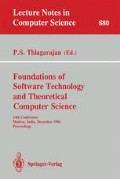Abstract
We give a short introduction to Martin-Löf's Type Theory, seen as a theory of inductive definitions. The first part contains historical remarks that motivate this approach. The second part presents a computational semantics, which explains how proof trees can be represented using the notations of functional programming.
This research has been done within the ESPRIT Basic Research Action “Types for Proofs and Programs”. It has been paid by NUTEK, Chalmers and the University of Göteborg.
Preview
Unable to display preview. Download preview PDF.
References
P. Aczel. An introduction to inductive definitions. In J. Barwise, editor, Handbook of Mathematical Logic, pages 739–782. North-Holland, 1977.
S. Allen. A Non-Type-Theoretic Semantics for Type-Theoretic Language. PhD thesis, Department of Computer Science, Cornell University, 1987.
H. P. Barendregt. The Lambda Calculus. North-Holland, 1984. Revised edition.
M. Beeson. Foundations of Constructive Mathematics. Springer-Verlag, 1985.
F. S. P. W. Buchholz, W. and S. W. Iterated Inductive Definitions and Subsystems of Analysis. Springer, Berlin, 1981.
R. M. Burstall. Proving properties of programs by structural induction. Computer Journal, (39): 135–154, 1985.
T. Coquand. Infinite objects in type theory. In Proceedings of the 1993 TYPES Workshop, Nijmegen, LNCS 806, 1993.
J. Despeyroux. Proof of translation in natural semantics. In Proceedings of the First ACM Conference on Logic in Computer Science, pages 193–205, 1986.
E. W. Dijkstra. A Discipline of Programming. Prentice-Hall, 1976.
P. Dybjer. Inductive families. Formal Aspects of Computing. To appear.
K. Gödel. Collected Works, Volumes I and II. Oxford University Press, 1986.
J. A. Goguen, J. W. Thatcher, E. G. Wagner, and J. B. Wright. An Initial Algebra Approach to the Specification, Correctness, and Implementation of Abstract Data Types. Prentice Hall, 1978.
D. Gries. The Science of Programming. Springer Texts and Monographs in Computer Science, 1981.
M. Hagiya and T. Sakurai. Foundation of logic programming based on inductive definition. New Generation Computing, 2: 59–77, 1984.
L. Hallnäs. Partial inductive definitions. Theoretical Computer Science, 53: 335–343, 1991.
J. Herbrand. On the consistency of arithmetic. In J. van Heijenoort, editor, From Frege to Gödel, pages 618–628. Harvard University Press.
C. Hoare. Recursive data structures. International Journal of Computer and Information Sciences, 4: 105–124, 1975.
W. Howard. Functional interpretation of bar induction by bar recursion. Compositio Mathematica, 20:107–124.
G. Kahn. Natural semantics. Technical Report 601, 1987.
S. Kleene. On the interpretation of intuitionistic number theory. Journal of Symbolic Logic, 10: 109–124, 1945.
G. Kreisel. Interpretation of analysis by mean of constructive functionals of finite type. In Heyting, editor, Constructivity in Mathematics, pages 101–128. North-Holland, 1959.
F. W. Lawvere. Equality in hyperdoctrines and comprehension schema as an adjoint functor. In A. Heller, editor, Applications of Categorical Algebra, Proceedings of Symposia in Pure Mathematics. AMS, 1970.
K. Lorenzen. Métamathématique. Edition Gauthier-Villars, 1962.
P. Martin-Löf. Notes on Constructive Mathematics. Almqvist & Wiksell, Stockholm, 1968.
P. Martin-Löf. Hauptsatz for the intuitionistic theory of iterated inductive definitions. In J. E. Fenstad, editor, Proceedings of the Second Scandinavian Logic Symposium, pages 179–216. North-Holland, 1971.
P. Martin-Löf. An intuitionistic theory of types: Predicative part. In Logic Colloquium'73, pages 73–118. North-Holland, 1975.
P. Martin-Löf. The domain interpretation of type theory, lecture notes. In K. Karlsson and K. Petersson, editors, Workshop on Semantics of Programming Languages, Abstracts and Notes, Chalmers University of Technology and University of Göteborg, August 1983. Programming Methodology Group.
P. Martin-Löf. Intuitionistic Type Theory. Bibliopolis, 1984.
J. McCarthy and J. A. Painter. Correctness of a compiler for arithmetic expressions. In Mathematical Aspects of Computer Science, pages 33–41. AMS, 1967.
D. R. Musser. On proving inductive properties of abstract data types. POPL, pages 154–162, 1980.
C. Paulin-Mohring. Extracting fω programs from proofs in the calculus of constructions. In Sixteenth Annual ACM Symposium on Principles of Programing Languages. ACM, 1989.
G. D. Plotkin. A structural approach to operational semantics. Technical Report DAIMI FN-19, Computer Science Depratment, Aarhus University, Aarhus, Denmark, 1981.
E. Post. Absolutely unsolvable problems and relatively undecidable propositions. account of an anticipation. In M. Davis, editor, The undecidable. Raven Press, Hewlett, NY, 1965.
M. Sato. Adding proof objects and inductive definition mechanisms to frege structure. In D. H. Pitt, A. Poigné, and D. E. Rydeheard, editors, Proceeding of International Conference on Theoretical Aspects of Computer Software, pages 53–87. Springer-Verlag, LNCS 526, 1991.
D. S. Scott. Constructive validity. In Symposium on Automatic Demonstration, pages 237–275. Springer Lecture Notes in Mathematics 125, 1970.
W. W. Tait. Normal Derivability in Classical Logic. Springer, 1968.
M. Tatsuta. Realiability interpretation of coinductive definitions and program synthesis with streams. Proceedings of International Conference on Fifth Generation Computer Systems, pages 666–673, 1992.
A. S. Troelstra and D. van Dalen. Constructivism in Mathematics, an introduction. North-Holland, 1988.
J. Webb. Mechanism, Mentalism and Metamathematics. D. Reidel Publishing Company, 1980.
G. Winskel. The Formal Semantics of Programming Languages, an Introduction. MIT Press, 1993.
Author information
Authors and Affiliations
Editor information
Rights and permissions
Copyright information
© 1994 Springer-Verlag Berlin Heidelberg
About this paper
Cite this paper
Coquand, T., Dybjer, P. (1994). Inductive definitions and type theory an introduction (preliminary version). In: Thiagarajan, P.S. (eds) Foundation of Software Technology and Theoretical Computer Science. FSTTCS 1994. Lecture Notes in Computer Science, vol 880. Springer, Berlin, Heidelberg. https://doi.org/10.1007/3-540-58715-2_114
Download citation
DOI: https://doi.org/10.1007/3-540-58715-2_114
Published:
Publisher Name: Springer, Berlin, Heidelberg
Print ISBN: 978-3-540-58715-6
Online ISBN: 978-3-540-49054-8
eBook Packages: Springer Book Archive

